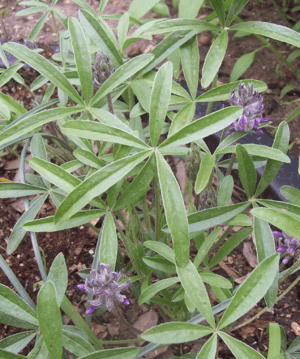Pediomelum hypogaeum facts for kids
Quick facts for kids Pediomelum hypogaeum |
|
|---|---|
 |
|
| Scientific classification | |
| Kingdom: | |
| (unranked): | |
| (unranked): | |
| (unranked): | |
| Order: | |
| Family: | |
| Genus: |
Pediomelum
|
| Species: |
P. hypogaeum
|
| Binomial name | |
| Pediomelum hypogaeum |
|
Pediomelum hypogaeum is a special plant. It is also known as Psoralea hypogaea. People often call it the little Indian breadroot or subterranean Indian breadroot. This plant is a perennial herb, which means it lives for many years. You can find it growing in the black soil prairies of Texas.
How Little Indian Breadroot Grows
This plant has a unique way of growing. Its flowers grow on stems that are about 5 to 6 centimeters long. These stems grow separately from the leaves. They come from an underground stem and a deep, carrot-shaped root. This root is usually 3 to 7 centimeters long.
Leaves and Flowers
The leaves of the little Indian breadroot have long stalks. Each leaf is divided into five smaller parts, called leaflets. These leaflets are shaped like long ovals and are about 3 to 5 centimeters long.
The flowers are purple and look like small peas. They grow in tight groups, also separate from the leaves. What's really interesting is their strong smell! It reminds some people of lemon furniture polish.
Edible Roots
The roots of Pediomelum hypogaeum are special because they are edible. They are also known as tuberous roots. These roots are a good source of protein. This makes them a valuable food source.
 | Jewel Prestage |
 | Ella Baker |
 | Fannie Lou Hamer |

